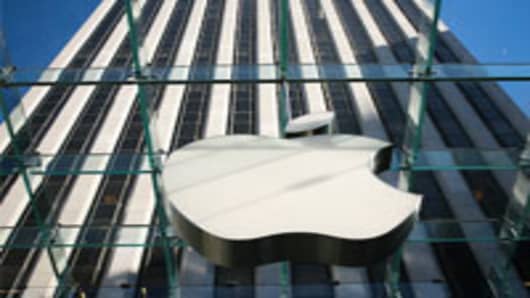I won't call it a war, but an intriguing battle is shaping up on Wall Street on the opinions running rampant about Apple Inc. and its prospects, both for this quarter and the coming year.
The week started with downgrades and pessimism from RBC Capital and Morgan Stanley. But yesterday, in the face of a strong wind against these shares, Citigroup and Goldman Sachs both stepped up to say that Apple's actually in pretty good shape. Maybe lowering price targets, but still bullish on longer-term trends.
It's a matter of perspective and balance and true analysis. And that's where Wall Street might not be measuring up when it comes to studying not just Apple, but indeed so many other companies and their fundamentals. Take, for example, the study released by RBC and ChangeWave, purporting to show a slowdown in Apple's business, and therefore the reason behind the firm's downgrade.
But rather than just offering up the results of the survey, they beg for some deeper perspective. RBC determined that 17 percent of respondents are likely to buy a Mac laptop in the next 90 days, down from 19 percent a month earlier. And 23 percent say they were likely to buy a Mac desktop, down from 24 percent a month earlier. I don't know about you, and I hardly want to be the one trying to accentuate the positive, but it seems those declines are very, VERY slight, and in an economy like this one, a miniscule decline for expensive products in the consumer electronics space might actually be good news.
I understand that Apple's slowdown, if there even is one, isn't great. But if the slowdown--again, if there even IS one--is occurring at a far slower pace than the rest of the sector, isn't that good? Also, it seems none of these analysts is worried about the current quarter, but what may happen some time next year. If at all. If this macro-economic slowdown continues, or deepens. Which Apple has already shown it can withstand better than most.
- JAMF Software Announces JSS Mobile Application For Apple App Store
- Stock Picks: Energy, Healthcare & Financials
- Slideshow: How Your Tax Dollars Are Spent
More galling to me is the underlying concern that Apple won't be able to meet gross margins expectations.. Why galling? Apple expected margins of 30 percent and said so. The Street then ratcheted up its expectations to 33 percent. Apple says 30 percent. Maintains 30 percent. Now, there's concern on the Street that Apple won't meet expectations. Not its own, but the Street's! And analysts slam the company over worries that it will come up short. Come on. What kind of bizarre game is that?
I don't doubt RBC's data, or the real concern the firm apparently has about Apple's future. This firm, and analyst Mike Abramsky, do solid work. There are certainly two sides--maybe 12 or 20 sides--and that's what makes a market.
I know Wall Street has a job to do. So does Apple. Apple routinely sandbags numbers, I believe, to lower expectations so it can "beat the Street" when it releases earnings. They need to do better offering realistic guidance.
But the Street also needs to do a better job managing its own expectations, and offering meaningful analysis of the data, not just the data itself. Both sides of the story.
Apple's volatility, as these two sides bicker about the numbers, has been the end result. With investor nest eggs hanging on the balance.
Questions? Comments? TechCheck@cnbc.com


